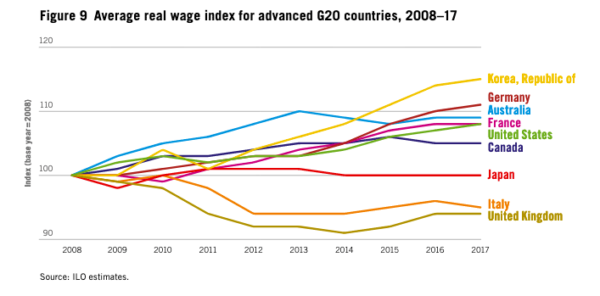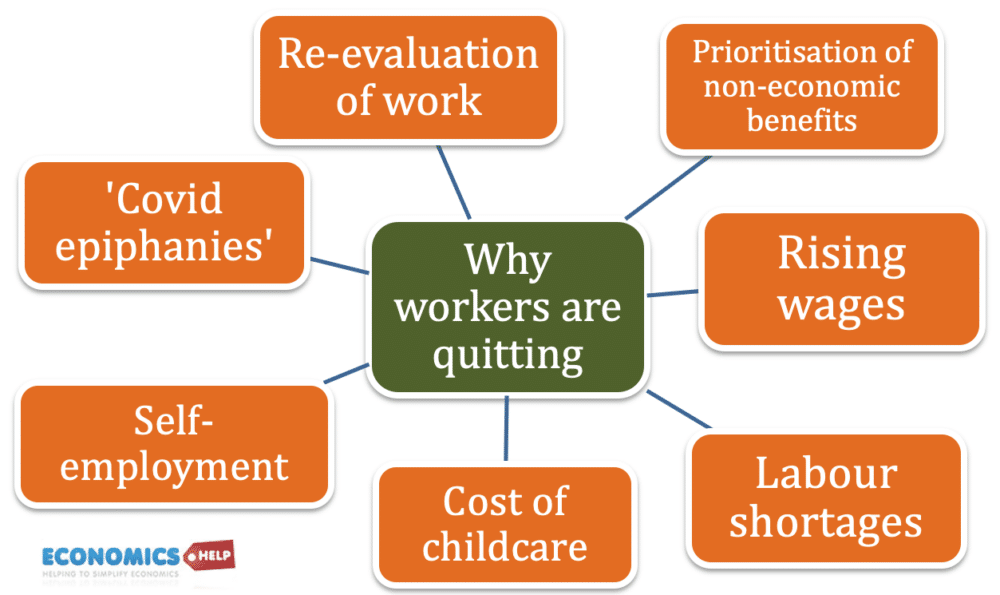One of the great events in European economic history was the great plague of the 14th Century. The Black Death, which swept across Europe (killing up to 30% of citizens), led to a profound change in economic circumstances. Due to the shortage of labour, peasants were freed from their serfdom. With great demand for labour, survivors were able to leave their virtual slave-like jobs and move to cities where they could demand higher wages. It ended the old feudal system and is a classic example of extreme market forces pushing up wages.
The Covid pandemic of 2020-21 is nothing like the Black Death, but the pandemic has contributed to many workers re-evaluating their job and has encouraged many workers to quit their job. It has become known as the “Great Resignation”. According to a Microsoft survey of more than 30,000 global workers – 41% of workers were considering quitting or changing professions. Each month, the U.S. Bureau of Labor Statistics is announcing record rates of workers quitting their job. For example, in August 2021, 4.3 million Americans or 2.9% of the population quit.
What is driving these changes in jobs? Some of the suggested factors are economic – demand for higher wages, unemployment benefits and stimulus checks. However, these are at best minor factors, with the biggest factors coming from a behavioural shift in workers who are re-evaulating their priorities.
Video summary
Main Factors
Change in attitudes Covid lockdowns brought a huge change to many workers. It jolted them out of their usual commute-work pattern. Spending time working from home, led many to question whether they want to go back to the old drudgery of a long commute, and long hours for low pay. A key thing about the Covid pandemic is that it has led workers to under a real evaluation of what they want to do. In behavioural economics, a key issue is that of status quo bias. – we stick with what we have and what we know. This means even if we have a low paid, unlikeable job, we stay in the job, because it is difficult (or appears difficult) to change. However, Covid, lockdowns and a general feeling of change in the air, is making workers willing to take a risk as they feel they can do better than the current job. Dr Anthony Klotz an associate professor at Texas A&M University, puts in terms of workers having epiphanies.
“There is evidence that people have been doing thinking during the pandemic in terms of how their life is going and have had some epiphanies and decided they want to make some changes to their life. And this could involve deciding to leave the workforce and stay home with family, to start a business, to pursue a hobby, perhaps retire early.” (BBC)
Shift in work-life balance. The Covid pandemic has led many people to re-question their priorities in terms of work-life balance. Combined with environmental concerns some are willing to take lower income because of a conscious desire to consume less and try and make do with a simpler lifestyle. This is something economics has not always fully accounted for. Economics tends to view the workplace in terms of income, incentives. But actually, for many people, there are many more important considerations such as how am I treated at work? Is there a sense of responsibility and satisfaction? If workers feel mistreated and badly looked after, then now they are willing to quit their job.
Wage growth returns. A remarkable feature of the post-2009 economic recovery is how for many workers (especially low-paid) workers, real wage growth has been very poor. Wages have fallen behind productivity growth as the income distribution has become more unequal.
 It has left many workers in low-paid jobs. Covid has been a spur for workers to seek higher wages. Given the number of labour shortages, it is has put workers in a better position, and wages in key jobs like drivers, meat packers and fruit pickers have risen in response to the on-going labour shortage. It has created a situation where the labour market is favouring workers more than employers and firms struggle to fill key vacancies. Well publicised vacancies and rising wages all create an incentive for workers to quit because they can be more confident of finding a better job.
It has left many workers in low-paid jobs. Covid has been a spur for workers to seek higher wages. Given the number of labour shortages, it is has put workers in a better position, and wages in key jobs like drivers, meat packers and fruit pickers have risen in response to the on-going labour shortage. It has created a situation where the labour market is favouring workers more than employers and firms struggle to fill key vacancies. Well publicised vacancies and rising wages all create an incentive for workers to quit because they can be more confident of finding a better job.
What about generous unemployment benefits/stimulus checks? The stimulus check of $1000 that American workers received may have given some confidence to shift jobs. It is a cushion that enables a worker to consider change or career or self-employment. However, there is little evidence that unemployment benefits are enough to make workers give up employment. For example, states which ended the enhanced federal unemployment benefits early ($300 a week) saw the same job growth as states which kept the enhanced unemployment benefits (WSJ) Unemployment benefits are still relatively low compared to real wages and not sufficient to drive the rates of job quitting.
Costs of childcare. Another economic issue is the cost of childcare. Women in two-income households are quitting the labour markets because the costs of childcare make relatively low paid work undesirable. In the US, the cost of childcare has risen much faster than wages. The average cost of a full-time child-care program in the U.S. is now $16,000 a year. According to one study child spending on child care, increased 2,000 per cent—from 1970 to 2010. With this kind of rising costs, two-parent families are better off having one parent stay at home and save childcare costs.
Rise in business startups and entrepreneurs. The pandemic has encouraged the growth of business startups as more people wish to work for themselves and be in charge of their own destiny. The pandemic has led to growth in sectors of the economy in IT, design and related services. Between June and September 2021, nearly 1.4 million startups were founded, a 49 per cent increase over the second quarter–and a 67 per cent increase over the previous third-quarter startup high set in 2018. It is a record level in US History.
The rise in savings. The pandemic led to a rise in savings for many middle-class people. During the pandemic spending on foreign travel, commuting and going out fell dramatically, but at the same time, many people’s income remained the same or even increased. This led to a rise in savings for white-collar workers who maintained jobs but had lower outgoings. With higher savings, it gives more of a cushion to switch career paths or even retire early. Many young people are seeking to gain income from trading on real estate, the stock market and cryptocurrency. Robinhood reports over 22.5 million accounts that are actively used.
Early retirement. A big factor in workers quitting jobs is the number of people retiring early. According to the BLS, around 21.2 million Americans in their 60s are no longer in the labour force. This is not just older people with savings voluntarily taking retirement. It is also due to older workers finding the job market harder with a preference for young workers. Jobs with high covid risk also increase the incentive for the old to take early retirement.
Summary of factors
Anecdotal evidence
I know of two friends who have quit their job since the start of Covid. One realised just how much he hates commuting into the city centre. He fared well from pandemic economically in terms of saved money and investments in stock market. Another friend liked the idea of living on income support in the UK and living a very frugal lifestyle. (I don’t think he will be able to get benefits for much longer)
Related

